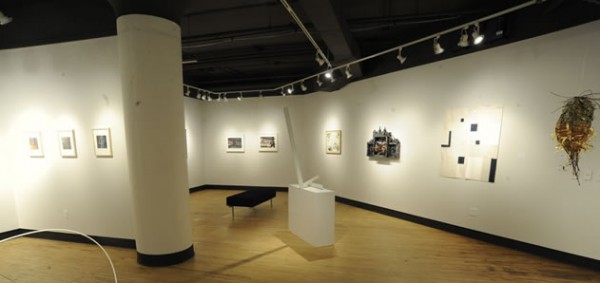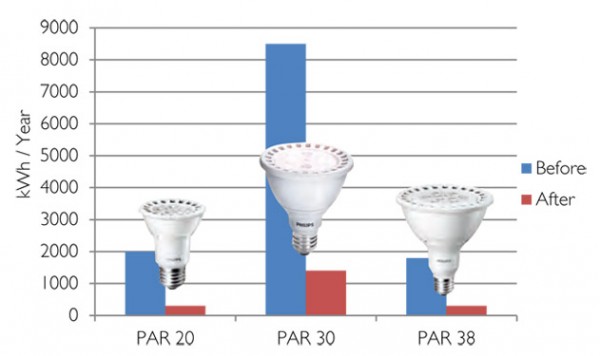“I visited the Philips Lighting Application Center earlier in the year which helped me learn more about the application of LEDs and where they made sense” Steve Kendig, Facilities Manager
Background
The University of Dayton, located in Dayton,Ohio, is the largest private university in the state of Ohio. Managing the energy consumption of a university that large is no easy feat, but that’s exactly what is asked of Steve Kendig, the Energy Manager for Department of Facilities Management, who manages all of the buildings located on the university’s campus. Energy consumption is one of the main things Steve focuses on, constantly striving to lower energy use as well as advance the sustainability footprint of the school. One project that was spurred through his ever constant battle to curb energy usage was within the Department of Visual Arts. This department provides quality education in multiple fields of art, from history to photography to graphic design. Not only are they focused on ensuring their students receive top notch education in their fields of study, but they also strive to create an environment that benefits those who use the space. Lighting is a key element in the University of Dayton’s Department of Visual Arts, so for them to make a decision on changing that element was a huge challenge for Steve to take on.
Challenge
As part of their commitment to sustainability, The University of Dayton has been very proactive in finding new ways to lower energy consumption all over campus, which often includes new lighting solutions. “The art department was happy with the lighting they had and were very resistant to change” said Judith Huacuja, Chair of the Department of Visual Arts. The lighting situation that Steve was confronted with included incandescent and halogen PAR20’s, PAR30’s and PAR38’s. These lamps ranged anywhere from 75W to150W, and were usually on for around 15 hours a day. The scope of this project would span three areas within the department: studios for different forms of art creation, large display areas, and the University’s Art Gallery, totaling 478 lamps in all. In order to gain the departments buy in, Steve knew he would have to prove that LED lighting can provide the quality of light that suits the needs of those using it. “The faculty had a misunderstanding about contemporary lighting technology. They heard bad things about LED and were thus very wary of trying it” said Judith. A variety of LED replacement lamps from various manufacturers were brought in for evaluation to ensure the department was satisfied with the aesthetics and quality of light the LEDs provided. Steve was confident that the department would be more than pleased with the offering at hand, “I visited the Philips Lighting Application Center earlier in the year which helped me learn more about the application of LEDs and where they made sense” said Steve. Upon much evaluation, the staff chose the LED lamps that were both aesthetically pleasing as well as maintained the quality of light they were looking for, which resulted in a choice of the Philips AirFlux® retrofit LED lamps.
Solution
The latest line of LED PAR lamps from Philips features a patented new technology known as AirFlux®. This proprietary technology uses a unique design which allows air to flow throughout the lamp, eliminating the need for a large heat sink thereby making it lightweight and easy to handle. The project was installed during off hours, so there were no disruptions to business as usual, a huge benefit regarding the compatibility of Philips AirFlux® LED lamps in existing sockets.
-

-
Solutions to University of Dayton
Upgrades included switching out (361) 75W PAR30 Halogen lamps to Philips 13W PAR30 LEDs, yielding an energy savings of just over 70,000 kWh which translates to over $4,230 a year. Another portion included (86) 75W PAR20 Halogen lamps converted to Philips 9W PAR20 LEDs, which saved almost 18,000 kWh and over $1,000 dollars per year.
-

-
Art Gallery
The final piece of the project switched (31) 150W PAR38 Incandescent lamps over to Philips 19.5 PAR38 LEDs, saving over 16,000 kWh and almost $800 dollars a year. These LEDs were chosen because of their ability to mimic the source they were replacing, which means the original test installation was successful in portraying beam patterns, quality of light and maintaining sufficient light levels. One of the great things about the Philips retrofit LED lamps is that they’re a one for one replacement with traditional technology, so installation is as easy as screwing in a light bulb!
-

-
Art Gallery
Benefits
The LED retrofit done with the art department at the University of Dayton was a very successful project, yielding not only happy workers and students, but also tremendous energy savings. The total savings of the project was over 100,000kWh, which translates to $6,068 per year based on annual usage and local energy rates. A huge factor in being able to get this project approved was being able to validate it financially, which had a big boost from the local utility, Dayton Power & Light. “The DP&L Business Rebate Program offers incentives to upgrade to energy efficient lighting” according to Julie Birchfield, a representative from Dayton Power & Light. “There were multiple rebates processed for this project, some were part of the Rapid Rebates™ prescriptive program, which had a $10 per lamp incentive for the PAR20 LEDs and PAR30 LEDs. The PAR38 LEDs fell under the custom program, which stipulates they have to be less than a 7 year payback to award the incentive of $0.05/kWh and $50/kW saved” said Julie. Fortunately because the 19.5W PAR38 LEDs were replacing 150W light bulbs, the payback (time it takes to recoup initial investment in energy savings) ended up being less than a year and received an incentive of approximately $17.50 per lamp. All in all, The University of Dayton received $5,100 in rebates from DP&L for this project, which when combined with the energy savings led to a payback of approximately 1.28 years.

“The University of Dayton utilizes our incentive programs quite often and are viewed as a great partner driving sustainability and efficiency across many of their facilities” replied Julie when asked about the university’s involvement with the utility. Other major benefits according to the facilities team include the maintenance savings associated with LED light sources, since these lamps often last anywhere from 10 to 25 times longer than traditional light sources which helps extend the re lamp cycles. Another factor was that the LEDs produce much less heat, thereby lowering the HVAC costs and providing a cooler atmosphere. LEDs also emit virtually no UV or IR in their beams of light, which when showcasing artwork is an important factor considering the integrity of the objects being lit. When asked to describe the project in one statement, Judith from the art department summed it up as follows – “It was tremendously successful, we have very discerning artists and designers and they are extremely satisfied with the outcome of the project.”





 CN
TW
EN
CN
TW
EN










